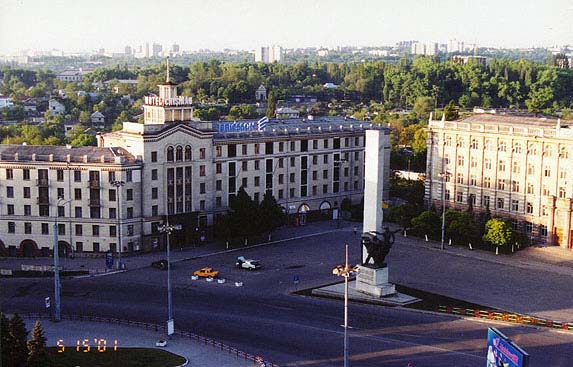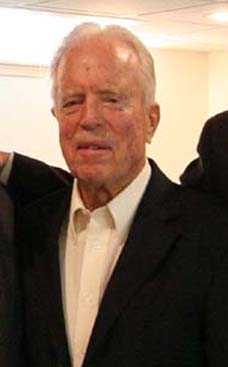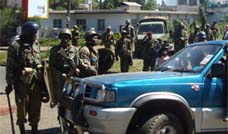
Chamberlain said in Mingir, the village of 6,000 peoplewhere she spent two years, her life mirrored what she imagined living in the early 20th century must have been like. “You don’t buy your chicken, you kill your chicken,” she said, laughing. While she enjoyed certain Moldovan dishes like a chicken soup called zama and a corn meal “mush” called mamiliga, when she wrote home she often requested ranch dressing, which masked the taste of the country’s mostly fatty, oily food. Water came from a well that in the warmer months bred mosquitos, electricity was only provided at night and most outhouses were nothing more than “squathouses,” she said. With no Internet, spotty phone service and very little entertainment, she occupied most of her free time reading books from the Peace Corps office in Chisinau. The Peace Corps also supplied volunteers with Newsweek so they didn’t lose track of current events. Sometimes, they become part of current events – as Chamberlain did in 2004 when she was visiting the Ukrainian capital of Kiev and saw protesters in the Orange Revolution, a political uprising in response to electoral fraud. During the winter in Moldova, Chamberlain said the roads weren’t plowed and sometimes there was little more than vodka and salted fish in the stores. In the spring, summer and fall, though, she said the countryside came alive with mile after mile of beautiful grape vineyards.
Nicole Chamberlain was a Peace Corps volunteer in the former Soviet republic of Moldova, the poorest country in Europe, a country where even basic health care can’t be taken for granted.
A new view from an Eastern European Adventure
By Catherine Fahy
I&M Arts Editor
In ?a country slightly larger than the state of Maryland with a population of 4.4 milli– 80 percent of whom live in poverty – Nicole Chamberlain found love and a lasting appreciation for the importance of fundamental health care.
Chamberlain, whose father works summers in the emergency room at Nantucket Cottage Hospital, was a Peace Corps volunteer in the former Soviet republic of Moldova, the poorest country in Europe, a country where even basic health care can’t be taken for granted.
Chamberlain told the story of a man who lived near another Peace Corps volunteer’s host family who was brutally beaten for not handing over some tomato seeds to a group of men who demanded them. Without $100 to pay a doctor to treat him, he was left to die outside a village health clinic.
“You’d have to bribe a doctor to get adequate healthcare. It’s incredible how someone can sit and watch someone die without taking care of them. We’re really lucky in America, where hospitals have to take care of someone if they’re sick,” said Chamberlain, who’s been visiting the island for a decade since her father, Rick, started working summers at the hospital.
Formerly part of Romania, Moldova became a Soviet republic at the end of World War II, then an independent country when the Soviet Union collapsed in 1991. The Russians still retain a presence, however, because of their support of the eastern Moldovan territory of Transnistria, which unofficially declared independence from Moldova in 1990 with Russia’s support. Plagued by poverty and corruption, in 2001 Moldova became the first former Soviet state to elect a Communist president.
When Chamberlain saw the Moldovan capital of Chisinau for the first time in June 2003, she said from a distance it looked beautiful because it is dotted with trees, but as she got closer she saw the buildings were run down. “If you move from west to east in Europe you see a gradual decline,” she said.
Chamberlain, 25, returned home Aug. 17 after two years abroad, and after a month-long “honeymoon” of sorts in Europe with her fiancé and fellow Moldovan Peace Corps volunteer Brian Snow.
Chamberlain met Snow, who’s from San Diego, almost as soon as she arrived in the country and they were assigned to the same training village outside Chisinau.
Though ultimately dispatched to villages at virtually opposite ends of the long, narrow country between Ukraine and Romania, Chamberlain and Snow usually visited each other twice a month, talked on the phone when they could and traveled together when they had time off. Chamberlain said Peace Corps volunteers accumulate two vacation days a month.
On one of those vacations, in Greece, where some of the Peace Corps volunteers were running the original Athens marathon route, Chamberlain said Snow told her if she ran the 10K in an hour or less he’d buy her something nice. That something turned out to be an engagement ring. Their wedding date is Nov. 12 in Indiana, where her parents now live half of the year.
Chamberlain had thought about joining the Peace Corps after high school but ultimately waited until after college, when she wanted to experience more of the world while deciding what to do next. She started the Peace Corps application process in 2002 after graduating with a bachelor’s degree in biology and chemistry from Wilmington College in Wilmington, Ohio, the same town where she grew up.
“I wanted to basically just go and explore the world,” she said late last month in the hospital rental on Atlantic Avenue where her parents live May through October. While catching up with her parents on the island, Chamberlain also worked at the Sconset Market until it closed two weeks ago.
Chamberlain has since started applying to medical school, hoping two years as a health educator in a Third World country will prove she has the discipline to become a doctor. Later, she’d like to spend part of the year with an organization like Doctors Without Borders to continue helping underserved people in poor countries, she said.
While her life in Moldova improved during her second year of service after she’d made friends and learned the language, Chamberlain said her first year was tough. Trying to teach sixth and seventh graders health education in a strange language was hard enough without being homesick.
She said her mother was crying so hard when she left she couldn’t take her to airport. “It was very hard leaving my family,” said Chamberlain, who returned home just once for Christmas in 2003, six months after she’d left.
Chamberlain said in Mingir, the village of 6,000 peoplewhere she spent two years, her life mirrored what she imagined living in the early 20th century must have been like. “You don’t buy your chicken, you kill your chicken,” she said, laughing. While she enjoyed certain Moldovan dishes like a chicken soup called zama and a corn meal “mush” called mamiliga, when she wrote home she often requested ranch dressing, which masked the taste of the country’s mostly fatty, oily food.
Water came from a well that in the warmer months bred mosquitos, electricity was only provided at night and most outhouses were nothing more than “squathouses,” she said. With no Internet, spotty phone service and very little entertainment, she occupied most of her free time reading books from the Peace Corps office in Chisinau. The Peace Corps also supplied volunteers with Newsweek so they didn’t lose track of current events.
Sometimes, they become part of current events – as Chamberlain did in 2004 when she was visiting the Ukrainian capital of Kiev and saw protesters in the Orange Revolution, a political uprising in response to electoral fraud.
During the winter in Moldova, Chamberlain said the roads weren’t plowed and sometimes there was little more than vodka and salted fish in the stores. In the spring, summer and fall, though, she said the countryside came alive with mile after mile of beautiful grape vineyards.
Now that Chamberlain is fluent in Romanian, the Moldovan tongue, she said she hopes as a minor Romance language it can help her learn a language like Spanish or Italian. At the very least, she can practice at home with her husband, who’s also fluent.
While Peace Corps volunteers are given the option to move into their own places after six months, Chamberlain and Snow both stayed with their respective host families for two years. Chamberlain said it certainly helped her language skills and may have contributed to her safety as well.
“The majority of people who have problems are people who move out on their own,” she said.
Aside from her host family, Chamberlain said the person she’ll miss most is one of her students, a 14-year-old girl named Gheorghina. “It was hard leaving her knowing the future isn’t too bright in Moldova,” said Chamberlain, who hopes one day when she has enough money she can pay for Gheorghina to visit America.
Among other things, Chamberlain taught students personal hygiene, like flossing their teeth and washing their hands. She also introduced them to sex education and the danger of stereotypes. She said there’s a lot of discrimination in Moldova, particularly against the Romanian gypsies.
She said Moldovan children are particularly vulnerable because a full quarter of the adult workforce works outside the country. “What’s sad is mothers and fathers will leave children to fend for themselves,” she said.
It is estimated that between 600,000 and a million Moldovans are currently out of the country seeking work, while one-third of those who remain say that they would leave if they had a chance.
Hopefully, Chamberlain’s work will have enabled some of the country’s future adults in her classes to move with more ease in the global economy, and – maybe – help improve their own country’s economy. “It’s a very worldly experience and it’s an unbelievable experience,” she said.









